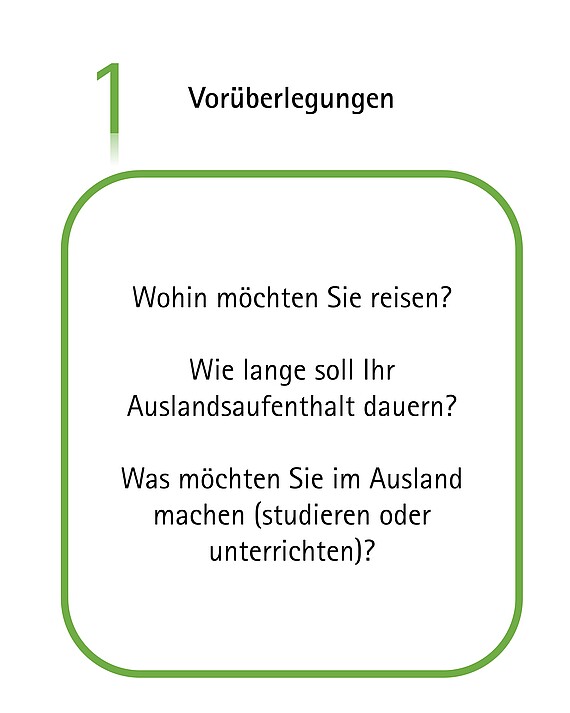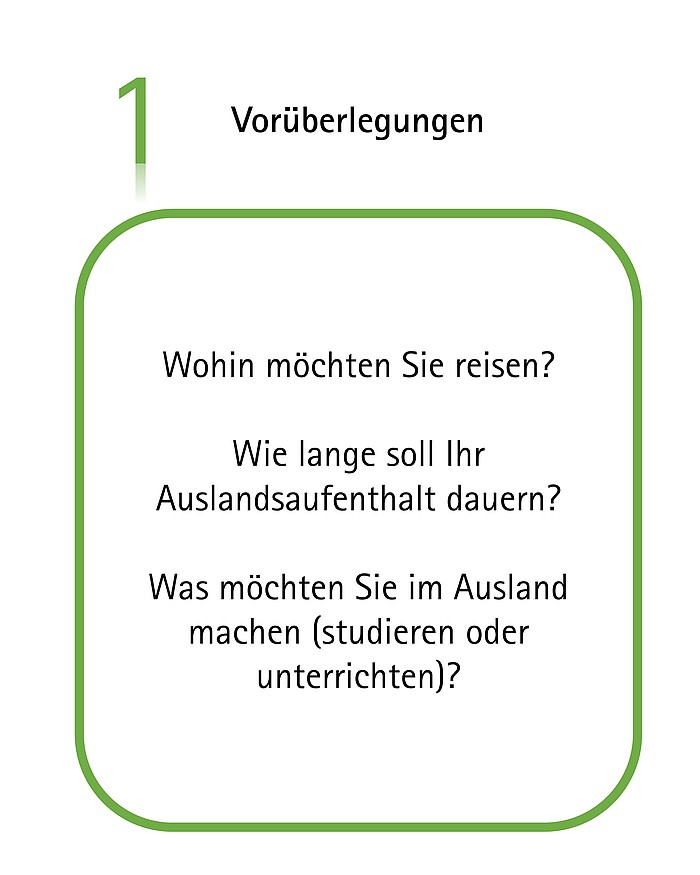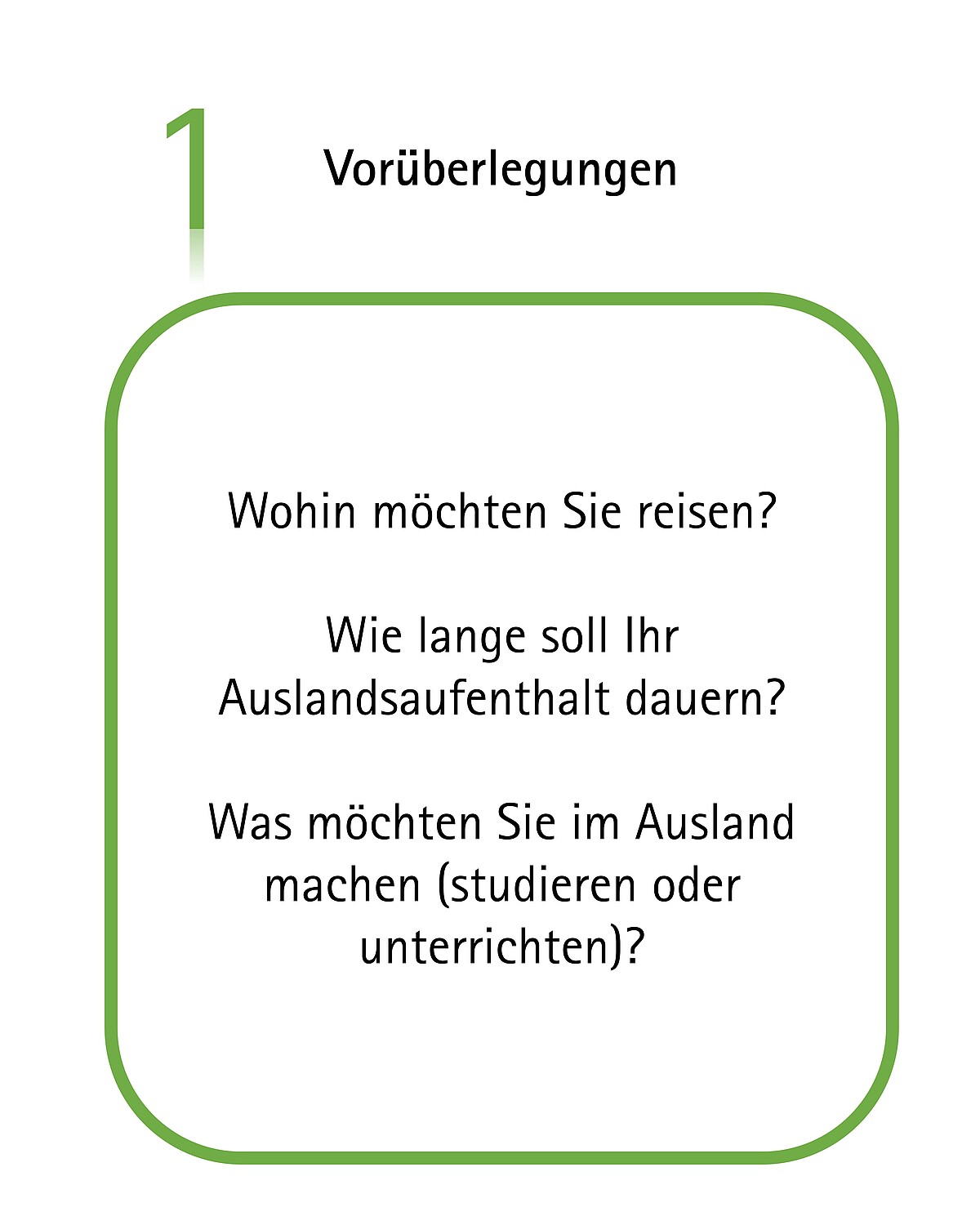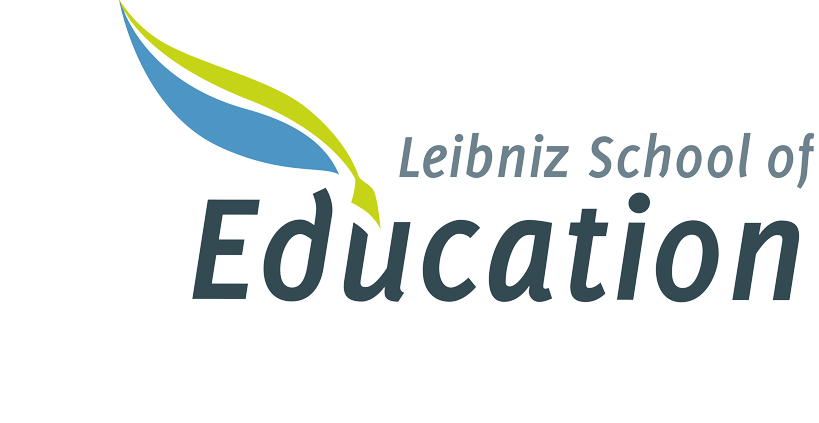

 ©
Lucas George Wendt auf Unsplash
©
Lucas George Wendt auf Unsplash
If you are interested in gaining international and intercultural experience in teacher education, you will find information here about the possibility of studying abroad or doing internships abroad.
A semester abroad or an internship abroad enables teacher education students to get to know new pedagogical approaches, develop intercultural skills, improve their language skills and make international contacts. It also offers the opportunity to compare different education systems and prepares students for everyday teaching with heterogeneous classes.
Questions before your stay abroad
Here are some questions you should ask yourself before going abroad. Further questions and answers that will be useful for organizing your stay abroad can be found further down on this page.



![[Translate to English:] Informationen: Lesen Sie sich die verfügbaren Informationen auf der Homepage der LSE und des Hochschulbüros für Internationales durch. Informieren Sie sich insbesondere über Anerkennungsmöglichkeiten. Vereinbaren Sie, wenn nötig ein Beratungsgespräch.](https://www.lse.uni-hannover.de/fileadmin/_processed_/8/5/csm_Folie2_433f8ff61b.jpg)
![[Translate to English:] Informationen: Lesen Sie sich die verfügbaren Informationen auf der Homepage der LSE und des Hochschulbüros für Internationales durch. Informieren Sie sich insbesondere über Anerkennungsmöglichkeiten. Vereinbaren Sie, wenn nötig ein Beratungsgespräch.](https://www.lse.uni-hannover.de/fileadmin/_processed_/8/5/csm_Folie2_97d71427a0.jpg)
![[Translate to English:] Informationen: Lesen Sie sich die verfügbaren Informationen auf der Homepage der LSE und des Hochschulbüros für Internationales durch. Informieren Sie sich insbesondere über Anerkennungsmöglichkeiten. Vereinbaren Sie, wenn nötig ein Beratungsgespräch.](https://www.lse.uni-hannover.de/fileadmin/_processed_/8/5/csm_Folie2_52e1664100.jpg)
![[Translate to English:] Finanzierung: Gibt es Stipendien und andere Förderungen, die für Sie in Frage kommen? Möchten Sie AuslandsBAföG beantragen? Möchten Sie sich an der Heimatuniversität beurlauben lassen?](https://www.lse.uni-hannover.de/fileadmin/_processed_/d/e/csm_Folie3_e48e43abce.jpg)
![[Translate to English:] Finanzierung: Gibt es Stipendien und andere Förderungen, die für Sie in Frage kommen? Möchten Sie AuslandsBAföG beantragen? Möchten Sie sich an der Heimatuniversität beurlauben lassen?](https://www.lse.uni-hannover.de/fileadmin/_processed_/d/e/csm_Folie3_8866158c22.jpg)
![[Translate to English:] Finanzierung: Gibt es Stipendien und andere Förderungen, die für Sie in Frage kommen? Möchten Sie AuslandsBAföG beantragen? Möchten Sie sich an der Heimatuniversität beurlauben lassen?](https://www.lse.uni-hannover.de/fileadmin/_processed_/d/e/csm_Folie3_a437a94c9c.jpg)



![[Translate to English:] Weitere Vorbereitungen: Möchte Sie einen Sprachkurs belegen? Was können Sie noch tun?](https://www.lse.uni-hannover.de/fileadmin/_processed_/5/1/csm_Folie5_01_6740aaf3e0.jpg)
![[Translate to English:] Weitere Vorbereitungen: Möchte Sie einen Sprachkurs belegen? Was können Sie noch tun?](https://www.lse.uni-hannover.de/fileadmin/_processed_/5/1/csm_Folie5_01_2d8f0d72e5.jpg)
![[Translate to English:] Weitere Vorbereitungen: Möchte Sie einen Sprachkurs belegen? Was können Sie noch tun?](https://www.lse.uni-hannover.de/fileadmin/_processed_/5/1/csm_Folie5_01_c6e822875b.jpg)
questions and answers
-
What should you take into account when planning?
- Planning a study visit should begin in good time so that deadlines can be met and any required language skills can be provided.
- Think about what goals you want to achieve with your study abroad. Clear goals help you choose a suitable target country and cooperation program.
- Define your personal priorities and framework, including language skills and professional/academic interests.
- Clarify your financial situation early on and inquire about scholarship programs or other financing options. Get advice on this. You can also find out more about this: “Financing stays abroad” on the website of the University Office for International Affairs.
-
Which universities abroad can I study at?
- You have the opportunity to take part in various programs in different regions or countries.
- The LUH has partner universities at university level; students from all faculties can apply for these exchange programs, provided the relevant subjects are offered at the partner university.
- On the websites of your study subjects you will find information about collaborations at faculty level through which you can realize a study visit
- Regardless of LUH programs, you can also organize a stay abroad yourself as a free mover. For this project, please contact the regional coordinator of the University Office for International Affairs in the target region.
-
Which contacts can support me with my planning?
-
As a contact person, you can contact the exchange coordinators for your study subjects; you can find them in the list of people in the relevant faculty.
-
The international advisor at the Leibniz School of Education offers advice on stays abroad and placement in your studies.
-
In addition, the University Office for International Affairs regularly offers online information sessions for an overview and region-specific consultation appointments: University Office for International Affairs
-
-
Where do I apply to study abroad?
- To take part in a cooperation program at faculty level, you apply directly to the exchange coordinator for your subject.
- To take part in exchange programs at university level, apply to the responsible person in the university office for international affairs.
-
Where can I find out which documents I need for the application?
- Which documents are necessary for the application process depends on the cooperation program. Further information can be found either on the website of the responsible institute or on the LUH website.
- As a rule: letter of motivation, CV, transcript of records, certificate of matriculation, language certificates, possibly a copy of the passport…
-
What advantages does a semester abroad offer for teacher education students?
A semester abroad enables teacher education students to get to know new pedagogical approaches, develop intercultural skills, improve their language skills and make international contacts. It also offers the opportunity to compare different education systems and prepares students for everyday teaching with heterogeneous classes.
-
How is recognition of achievements achieved abroad?
- In principle, it is possible for study and examination achievements completed abroad to be recognized under certain conditions.
- The prerequisite for the successful recognition of your achievements is the conclusion of a learning agreement between you, the faculty/subject and the foreign university.
- To do this, please find out about the recognition options from your responsible exchange coordinator for your subjects in good time before the start of your stay abroad.
-
What scholarships and funding are available?
Please take a look at the homepage of the University Office for Internationals: Financing a stay abroad
-
What should you take into account when planning?
- Planning an internship abroad should begin in good time so that the (application) deadlines can be met and any required language skills can be provided.
- Think about what goals you want to achieve with your internship abroad.
- Clear goals help you choose a suitable target country and cooperation program. Define your personal priorities and framework, including language skills and professional/academic interests.
- Clarify your financial situation early on and inquire about scholarship programs or other financing options. Get advice on this. You can also find out more about this: “Financing stays abroad” on the website of the University Office for International Affairs.
-
Which internships from the teacher training course can be carried out abroad?
- During the Bachelor's degree, the general school internship (ASP) can be carried out abroad.
- During the master's degree there is the possibility of completing a specialist internship abroad. Please clarify this in advance with those responsible for the department.
- Company internship after prior coordination with the internship representative of the study program.
- You can also do voluntary internships abroad.
-
At which schools can I do an internship abroad?
You can complete your internship at German schools abroad as well as at schools in the foreign school system.
-
Which contacts can support me with my planning?
- The international affairs officer at the Leibniz School of Education offers advice on internships abroad.
- For the ASP (school practical studies): internship representative from the IEW or IfBE; mostly lecturers of the preparatory seminar
- For a specialist internship: Internship representative for the teaching subject
- For the company internship (Tech.Ed.): Internship representative for the professional discipline
-
What programs are there for internships abroad?
- PädagogischerSCHULWÄRTS! Stipendienprogramm für Schulpraktika im Ausland
- Easy-go-easy-come – Schulpraktika Asien, Afrika oder Lateinamerika
- Amity Institute – Praktikum an einer Highschool in den USA
- Austauschdienst: Fremdsprachenassistenz
- Lehramt.international (DAAD)
- Erasmus+-Mobilitätsprojekt MIX IT
-
What is important for the recognition of the internship abroad?
The prerequisite for successful recognition is individual consultation with the responsible lecturers and attendance at the associated (preparatory) seminars at the LUH.
-
Is it possible to receive financial support for an internship abroad?
- Yes, there are various funding programs that can support the project. The respective framework conditions must be taken into account. (See also “What programs are there for internships abroad?”)
- Ask your contact person for advice on this.
Contact
Please direct any questions to the functional email address: internationales@lse.uni-hannover.de








